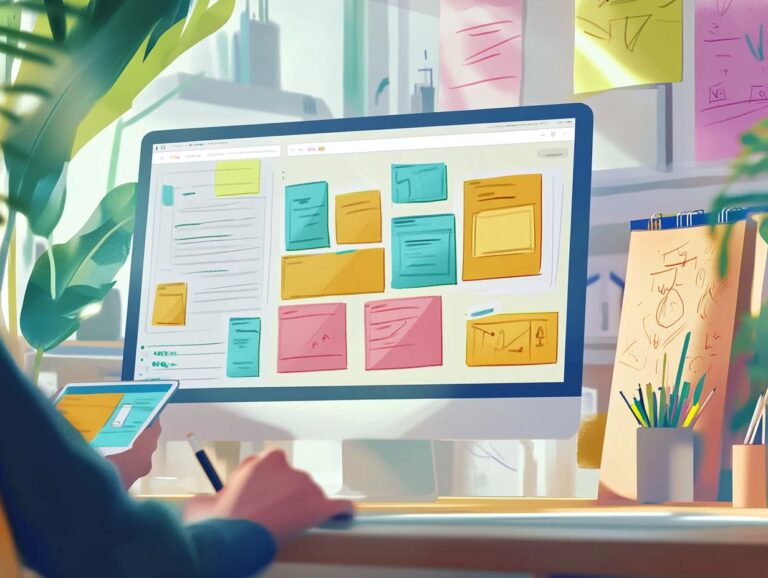How to Apply for Jobs Using AI?
Technology has revolutionized the way we search for jobs. Understanding this modern application process is essential for succeeding in a competitive marketplace.
This article explores the various ways technology influences job applications, including:
- Resume screening
- Job matching
- AI-powered chatbots
- Video interviews
- And more
It also addresses the benefits and challenges associated with technology in the hiring process and offers guidance on how to prepare for a tech-enabled application experience.
Contents
- Key Takeaways:
- What is AI?
- How is AI Used in the Job Application Process?
- What are the Benefits of Using AI in Job Applications?
- What are the Challenges of Using AI in Job Applications?
- How to Prepare for AI-based Job Applications?
- Frequently Asked Questions
- What is AI and how is it used in job applications?
- How can I utilize AI to improve my job search?
- What are the benefits of using AI in job applications?
- Is it safe to rely on AI for job applications?
- How do I prepare for an AI-powered job interview?
- What skills do I need to succeed in a job market that utilizes AI?
Key Takeaways:
What is AI?
Artificial Intelligence (AI) refers to the simulation of human intelligence processes by machines, particularly computer systems. These processes encompass the ability to learn, reason, and self-correct. AI programs typically utilize complex algorithms and models to analyze data and generate insights.
One notable example of AI is ChatGPT, a large language model developed by OpenAI that can understand and produce human-like text.
How is AI Used in the Job Application Process?
AI is transforming the job application process by enhancing the efficiency and effectiveness of interactions between job seekers and employers.
AI tools streamline application processes by automating tasks such as resume screening and job matching, enabling hiring managers to focus their attention on the most qualified candidates.
Furthermore, technologies like ChatGPT can provide personalized responses to questions within applications and assist in generating customized resumes and cover letters.
1. Resume Screening
Resume screening is an AI technology that evaluates submitted resumes to determine whether candidates meet the qualifications required for a position, as defined by hiring managers. This technology saves time and enhances the accuracy of candidate selection by utilizing data interpretation and metrics to identify the best-suited candidates for a role.
Algorithms and machine learning are employed to develop an AI-driven resume screening system capable of sifting through large pools of applicants to identify the specific skills and experiences needed for job requirements. Unlike traditional methods that often rely on manual reviews and subjective interpretations, this automated approach minimizes human bias and provides a more objective analysis of qualifications.
As a result, hiring teams can focus on the most promising candidates, leading to faster hiring processes. With the ability to increase efficiency and accuracy, more companies are adopting these technologies.
2. Job Matching
AI-driven job matching employs complex algorithms to assist job seekers in identifying positions that align with their skills, experience, and career aspirations. By analyzing job descriptions alongside candidate profiles, AI can deliver personalized job recommendations that enhance the job-seeking experience and increase the likelihood of successful placements in a competitive labor market.
Natural language processing (NLP) plays a crucial role in this process, enabling the systems to comprehend and interpret the nuances of job specifications and candidate qualifications. Machine learning models improve their accuracy over time by learning from user behaviors and interactions.
These technologies transform traditional job search methods by facilitating personalized interactions, allowing job seekers to receive notifications for roles that match their skills and identify areas for skill development. This data-driven approach streamlines recruitment for hiring companies and give the power tos candidates to make more informed decisions about their career paths.
3. Chatbots for Initial Interviews
AI-powered chatbots are increasingly being utilized for initial interviews, offering a scalable solution for hiring managers to conduct preliminary assessments of candidates. These chatbots can pose standardized application questions, interpret responses in real time, and gather essential data regarding applicants’ qualifications and soft skills, thereby enhancing the efficiency of the hiring process.
By automating the initial stages of recruitment, these intelligent systems significantly reduce the time spent on screening applicants, allowing human evaluators to concentrate on more strategic aspects of hiring. For example, they can analyze tone and language usage, providing insights that extend beyond mere qualifications.
This not only facilitates quicker decision-making but also enhances the overall candidate experience by delivering immediate feedback. Consequently, the use of chatbots in interviews streamlines operations and promotes a more objective evaluation of candidates, ensuring that only the most suitable individuals advance to the next stages.
4. Video Interviews
AI is transforming video interviews by offering tools that analyze candidates’ responses and body language, providing deeper insights into their abilities and cultural fit within the company. These technologies assist hiring managers in evaluating unique skills and soft competencies while enhancing the interview preparation process.
Automated assessments of tone, pace, and non-verbal cues represent a revolutionary approach to candidate evaluation that surpasses traditional in-person or recorded interviews. AI-powered systems can generate customized assessments for candidates, enabling them to practice and refine their interview performance before the actual event.
As candidates become more aware of their presentation and communication styles, AI streamlines the entire recruitment process, making it more efficient and effective. The integration of AI into interview preparation not only optimizes the recruitment workflow but also enhances the overall experience for both interviewers and candidates, ultimately improving the hiring industry.
What are the Benefits of Using AI in Job Applications?

The use of AI in job applications offers several benefits, including enhanced efficiency, accuracy, and an improved overall candidate experience.
By automating repetitive tasks, AI reduces the time spent on manual processes, enabling hiring managers to focus on the strategic aspects of recruitment. Furthermore, AI tools can enhance user experience by providing real-time answers and feedback, resulting in a more streamlined application process for job applicants.
1. Saves Time and Resources
One of the most significant benefits of AI in job applications is its ability to save time and resources for both job seekers and hiring managers. Automated processes, such as resume screening and job matching, enable companies to conserve their resources and focus on more important tasks, as these processes take less time to manage applications.
For instance, AI-powered resume screening tools can scan thousands of CVs in seconds, filtering candidates based on their qualifications and relevance to the job description. This not only accelerates the hiring process but also enhances the quality of candidate selection.
Additionally, chatbots equipped with natural language processing can assist candidates by promptly answering their questions, ensuring a smoother application experience. Ultimately, organizations can implement their hiring strategies more effectively, minimize time spent on low-value tasks, and improve the overall quality of hires.
2. Reduces Bias
AI has the potential to reduce bias in the hiring process by standardizing evaluations and concentrating on an applicant’s skills and experiences rather than personal information. This approach fosters a fairer assessment environment and encourages diversity in hiring, enabling companies to build a more inclusive workforce.
Organizations can utilize algorithms that analyze data objectively, thereby minimizing the unconscious bias often present in traditional recruiting practices. These systems ensure that all candidates, regardless of their backgrounds, are assessed based on relevant competencies, which enhances the overall quality of hires.
Additionally, AI tools can evaluate recruitment metrics and identify patterns of bias, allowing companies to continuously refine their inclusive recruitment strategies. Prioritizing fairness in recruiting not only attracts a wider range of talented individuals but also stimulates innovative ideas and perspectives, enriching the organizational culture as a whole.
3. Increases Efficiency
AI plays a significant role in enhancing the efficiency of job applications by automating various phases of the application process, from resume screening to job tracking. As a result, hiring teams can process applications more quickly and accurately, ensuring that the best candidates are identified in a timely manner.
By utilizing sophisticated algorithms, AI can rapidly evaluate resumes for specific keywords and qualifications, significantly reducing the time recruiters spend on manual evaluations. AI-powered applicant tracking systems help organize and manage candidate profiles, providing recruiters with a single platform to efficiently track and assess applicants.
This approach not only improves the consistency of the hiring process but also helps mitigate potential bias, leading to more equitable job selection policies. Furthermore, as candidates progress through interviews, AI tools can assist in providing personalized feedback and insights, thereby enhancing the overall experience for everyone involved in the process.
4. Improves Candidate Experience
AI enhances the candidate experience during the hiring process by providing personalized feedback and insights throughout the job application journey. This approach allows job seekers to gain a clearer understanding of their application status and identify areas for improvement, fostering a more engaging and supportive environment between candidates and potential employers.
By utilizing advanced algorithms and machine learning techniques, AI can analyze candidate responses and offer tailored feedback with specific, actionable tips to enhance their skills and credentials.
Automated communication tools ensure that candidates receive timely updates regarding their application progress, which helps to reduce anxiety and uncertainty. AI chatbots are increasingly used to facilitate seamless interactions, enabling applicants to ask questions and receive instant responses about the recruitment timeline or company culture.
These innovations not only streamline the hiring process but also reinforce the notion that employers value their candidates, ultimately leading to stronger relationships and improved employer branding.
What are the Challenges of Using AI in Job Applications?
The challenges associated with using AI in job applications include privacy concerns related to the storage and use of personal information, as well as potential errors in automated systems that may lead to misinterpretations of candidates’ qualifications or experiences.
1. Lack of Human Interaction
One of the most significant drawbacks of using AI in job applications is the lack of human connection, which can leave candidates feeling disconnected from the hiring process. While AI tools can enhance efficiency, they may also reduce opportunities for personal engagement, negatively impacting the overall candidate experience.
This absence of personal connection can lead applicants to feel dehumanized, as they may believe they are no longer regarded as unique individuals with their own stories and talents. When candidates submit their resumes to an automated system, they often feel uncertain about whether their qualifications are genuinely recognized or merely overlooked by algorithms.
The importance of human connection during recruitment is highlighted by the fact that these interactions are often crucial moments for candidates to form impressions of a company. A conversation can reveal not only qualifications but also passion, cultural fit, and enthusiasm elements of personal engagement that AI cannot replicate.
2. Potential for Error

The next challenge involves errors in AI systems, which can result in inaccuracies in assessing candidates and making hiring decisions. Despite technological advancements, algorithms may misinterpret resumes or fail to align them with the appropriate job requirements, thereby hindering the hiring process.
These inaccuracies can have serious consequences, such as underestimating qualified candidates or inadvertently favoring certain demographics over others. For companies aiming to build diverse and effective teams, this can lead to missed opportunities and a lack of innovation.
To mitigate these risks, organizations should ensure that AI systems undergo thorough testing and regular audits for fairness and transparency. Incorporating human insight alongside AI input in the hiring process can enhance the accuracy of candidate assessments, creating a more balanced approach that leverages both technology and human intuition.
3. Privacy Concerns
Privacy concerns pose a significant challenge when using AI in job applications, as candidates’ personal information may be collected and processed in ways that raise ethical questions. To maintain candidate trust and safeguard sensitive information, companies must ensure compliance with data protection regulations.
The implementation of AI systems in recruitment necessitates that organizations thoroughly evaluate their handling of applicant data throughout the hiring process. As reliance on algorithms to screen resumes and assess qualifications increases, employers risk inadvertently perpetuating biases if the underlying data is not properly managed.
Ethical considerations surrounding consent for data usage and transparency regarding how personal information is utilized are thus vital. By prioritizing data protection strategies and adopting ethical hiring practices, organizations can protect candidates’ privacy while also fostering a fairer and more inclusive job application landscape.
How to Prepare for AI-based Job Applications?
Job applicants can enhance their chances of success in the AI application process by understanding how AI systems function and by aligning their professional profiles with the needs of these systems.
Tailoring resumes to meet AI requirements, optimizing keywords, highlighting both soft and hard skills, and familiarizing themselves with AI-based interview formats can all significantly improve candidates’ outcomes.
1. Optimize Your Resume for AI Screening
To optimize your resume for AI screening, it is essential to include relevant keywords and phrases that align with the job description. This practice increases the likelihood of passing automated filters and makes your resume more appealing to both AI systems and hiring managers.
However, careful selection of keywords alone is not enough; the formatting of your resume is also crucial. Clear and organized layouts are easier for AI algorithms to process. Using standard headings, bullet points, and a clean design enhances clarity. Incorporating common job titles and industry-specific terminology is beneficial, as AI often looks for recognizable terms.
Additionally, customizing each resume for the specific job you are applying for demonstrates genuine interest in the position and ensures that key phrases relevant to that organization and role are included.
Lastly, keeping the document free of excessive graphics or images will improve the chances of accurate parsing by AI.
2. Familiarize Yourself with AI-based Interviews
Practicing for AI interviews is crucial for enhancing performance in this emerging format. As AI interviews become increasingly prevalent, candidates must learn how to effectively present their skills and experiences to these technologies.
To maximize their practice, candidates should seek platforms that offer interviews and practice sessions specifically designed for the AI interview format. One of the most valuable tools is the capability for candidates to record their answers, enabling them to review how they respond to questions, as well as to evaluate their facial expressions and body language, which are essential during remote interviews.
Additionally, access to support forums and communities focused on AI-assisted career preparation can help candidates connect with peers who have successfully navigated the process and share their insights. Understanding the most common types of questions asked in AI interviews, particularly behavioral and technical questions, will significantly contribute to building confidence.
3. Practice with AI Tools
Using AI tools can significantly prepare candidates for the job application process by enabling them to practice their responses to frequently asked interview questions. Platforms that offer simulated interviews allow candidates to build their confidence and enhance their communication skills.
AI-powered platforms such as Interviewing.io and Pramp enable users to engage in realistic interview sessions and receive instant feedback on their performance. Additionally, tools like HireVue utilize advanced algorithms to analyze candidates’ responses, body language, and presentation skills, allowing them to make necessary adjustments.
The personalized coaching features of applications like Pymetrics assist job seekers in identifying their strengths and weaknesses, enabling targeted practice. This approach not only prepares candidates for the types of questions they may encounter but also enhances their competitiveness in a crowded job market.
4. Highlight Relevant Skills and Experience
Emphasizing relevant skills and experience is crucial for personal branding in AI-driven job applications. Distinct skills that align with the job requirements will capture the attention of both AI systems and employers.
Frequently Asked Questions
What is AI and how is it used in job applications?
AI, or artificial intelligence, is a technology that enables computers to perform tasks that normally require human intelligence. It is used in job applications to streamline the hiring process by automating certain tasks, such as resume screening and candidate matching.
How can I utilize AI to improve my job search?
There are a few ways you can use AI to enhance your job search. Some job search platforms use AI algorithms to match your skills and experience with job openings, increasing your chances of getting noticed by employers. You can also use AI-powered resume builders to create a tailored resume for each job application.
What are the benefits of using AI in job applications?
AI can save time and effort by filtering through large volumes of job postings and resumes, making the job search process more efficient. It can also help eliminate human bias and increase diversity in the hiring process by focusing on skills and qualifications rather than personal characteristics.
Is it safe to rely on AI for job applications?
While AI can be a useful tool in the job application process, it’s important to remember that it is not infallible. It’s always a good idea to double-check the information provided by AI and make sure it accurately represents your qualifications and experience.
How do I prepare for an AI-powered job interview?
If you’re invited to an interview that involves AI technology, make sure to familiarize yourself with the platform beforehand. Practice answering common interview questions and be prepared to interact with AI-powered tools, such as virtual chatbots or video interviews.
What skills do I need to succeed in a job market that utilizes AI?
In addition to the traditional job skills, it’s becoming increasingly important to have a basic understanding of AI and how it is used in the workplace. Familiarity with data analysis, machine learning, and other AI-related concepts can make you stand out to employers in a job market that is increasingly relying on AI technology.








